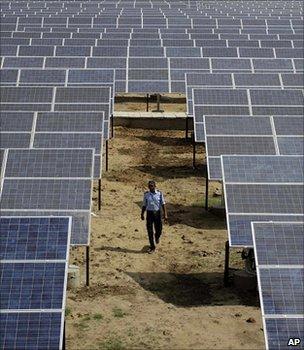Green energy investment hits record global high
- Published

India saw a 25% increase in renewables spending, with investment reaching $3.8bn in 2010
Global investment in renewable energy sources grew by 32% during 2010 to reach a record level of US$211bn (£132bn), a UN study has reported.
The main growth drivers were backing for wind farms in China and rooftop solar panels in Europe, it said.
It also found that developing nations invested more in green power than rich nations for the first time last year.
The Global Trends in Renewable Energy Investment 2011 report was prepared for the UN by Bloomberg New Energy Finance.
"The continuing growth in this core segment of the green economy is not happening by chance," said Achim Steiner, executive director of the UN Environment Programme.
"The combination of government target-setting, policy support and stimulus funding is underpinning the renewable industry's rise and bringing the much needed transformation of our global energy system within reach."
In 2010, developing economies spent more on "financial new investment", pumping $72bn into renewable projects compared with the $70bn outlay by developed economies.
China topped the table of investors again, spending $48.9bn - up 28% from 2009. There were also sizeable increases in investment from other developing or emerging economies:
South and Central America: up 39% (from 2009 levels) to $13.1bn
Middle East and Africa: up 104% to $5bn
India: up 25% to $3.8bn
However, the report stated, there was not growth in all sectors. There was a 22% decline in the investment in large-scale projects - such as windfarms - within Europe, where the funding fell to $35bn.
But there was a surge in small-scale projects, such as photovoltaic (PV) solar panels, especially within Germany, where investment in a "micro-solar boom" had increased by 132% to $34bn compared with 2009 figures.
As the renewable technologies continued to mature, the report added, the cost per megawatt (MW) continued to fall. It said that the cost of PV modules had fallen on a per-MW basis by 60% since 2008.
The authors forecasted: "Further improvements in the... cost of energy for solar, wind and other technologies lie ahead, posing a bigger and bigger threat to the dominance of fossil-fuel generation sources in the next few years."
Mr Steiner said that there was a number of key gatherings coming up over the coming 12 months that would help maintain the momentum towards renewables.
He said: "The UN climate convention meeting in Durban, South Africa, later in the year, followed by the Rio+20 summit in Brazil in 2012, offer key opportunities to accelerate and scale-up this positive transition to a low-carbon, resource-efficient green economy."
- Published29 March 2011
- Published15 July 2010